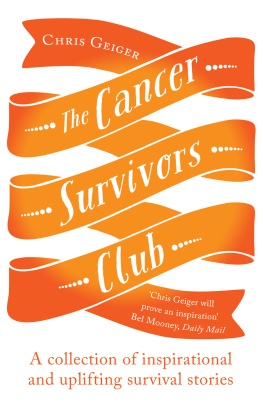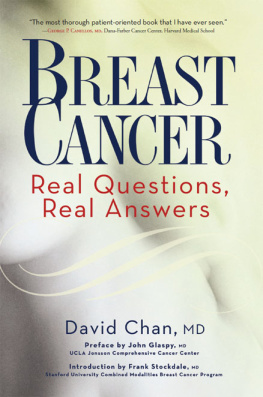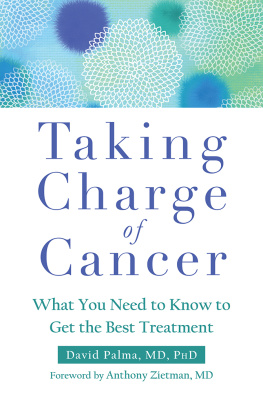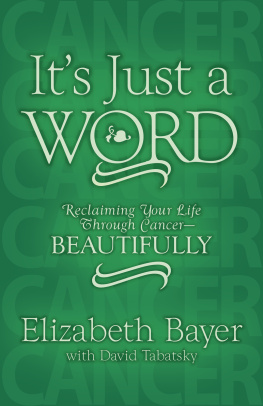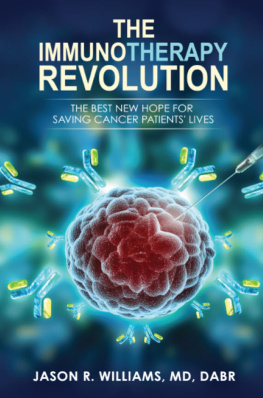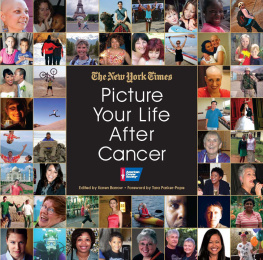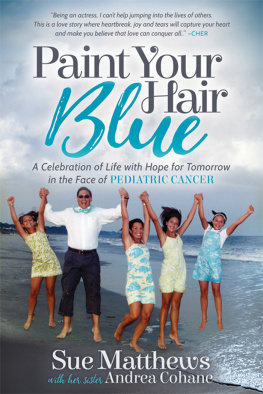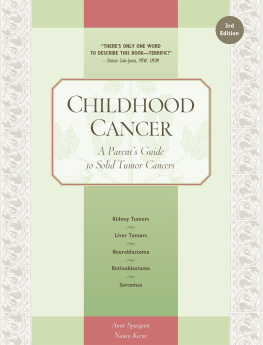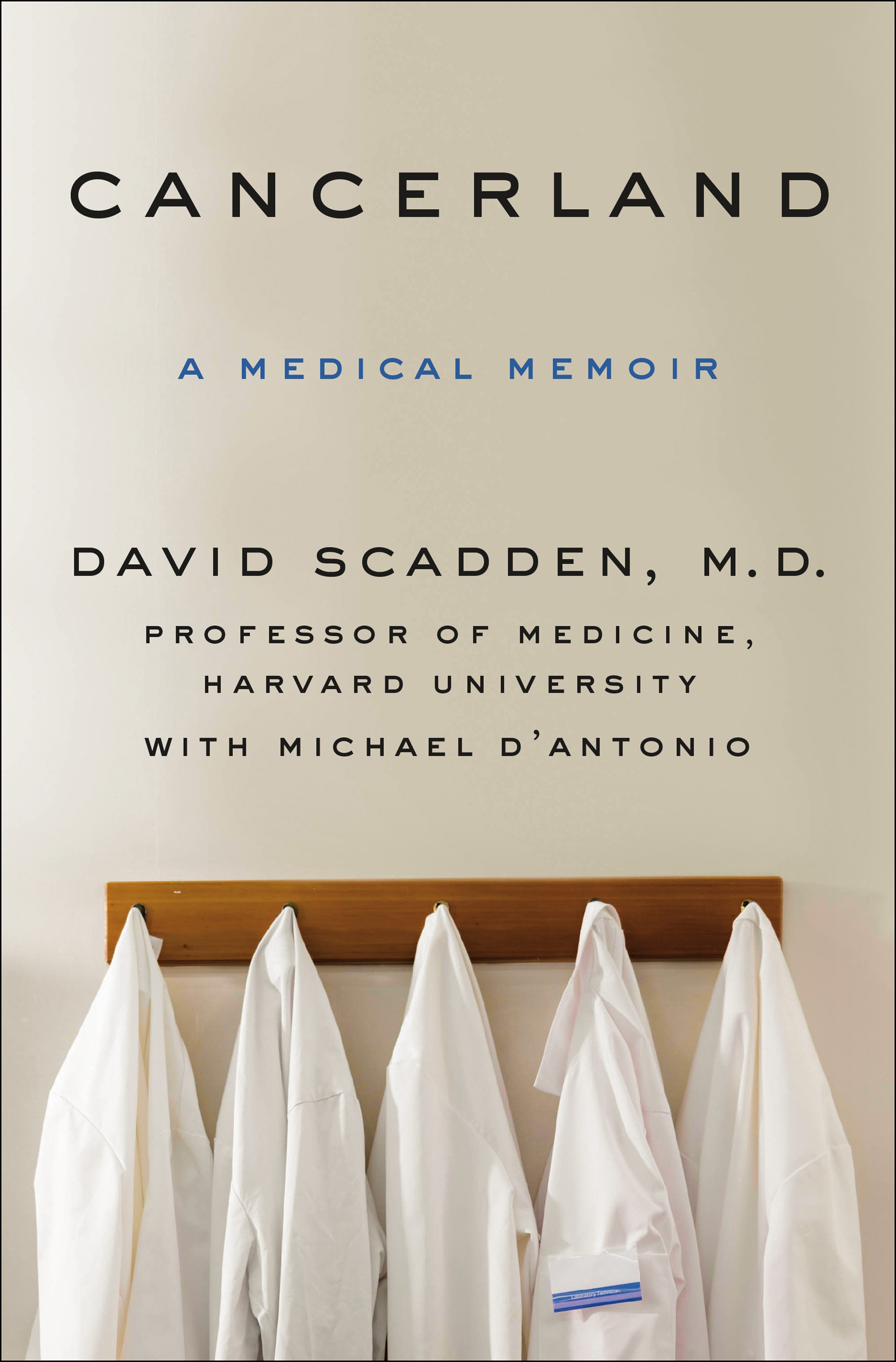Contents
Guide
Pagebreaks of the print version

The author and publisher have provided this e-book to you for your personal use only. You may not make this e-book publicly available in any way. Copyright infringement is against the law. If you believe the copy of this e-book you are reading infringes on the authors copyright, please notify the publisher at: us.macmillanusa.com/piracy.
FOR KATHRYN, MARGARET, ELIZABETH, AND NED
THERE ARE ONLY TWO LASTING BEQUESTS WE CAN HOPE TO GIVE OUR CHILDREN. ONE OF THESE IS ROOTS, THE OTHER, WINGS.
JOHANN WOLFGANG VON GOETHE
Mundt just disappeared. Mrs. Sullivan was spoken of in hushed tones before she, too, disappeared. Mrs. Macchi just slipped into the darkness of her home and never reappeared. They all moved from the living to the cancer-stricken, and my knowledge of them as a child was that cancer equaled irredeemable loss, unspoken of, incomprehensible and deeply sad. I suspect that experience was shared broadly fifty years ago and may be still. But it is wrong, or at least incomplete. Cancer no longer hoods hope, no longer is a mysterious vengeance of higher powers and slowly is becoming the thing that changes peoples lives, but something they can speak of in past tense. This book is some effort to map how much has changed in the nearly four decades of this oncologists experience and why. How ideas and serendipity evolve into medical advances at least as viewed by someone who has had a seat in the theater of change.
The book came about because Michael DAntonio and I were speaking of how much of what happens in science remains unknown to people outside of it. Science is a way of thinking about and discovering the basis for things we know through our experience. We know them, but dont know what causes them or how to change them. Science gives us a glimpse of what underlies or is the cause of what we experience by perturbing some element of the composite. By so doing, it defines what causes the composite to be what it is. That inherently gives some power to then change what is. Science, at least life science, opens the possibility of not just knowing what is but shaping it. Moving from understanding to shaping is inefficient and made all the more so when it involves people rather than experimental models in a laboratory. The maddening slowness of medical advance cannot be willed away or engineered out of the process. There are simply too many uncertainties. Michael and I thought that by opening the door on the process of medical advance, particularly in cancer, it might bring light and hope and perhaps some inspired action to accelerate the change we all so desperately need.
The experience of most when encountering cancer is to step into a foreign land, Cancerland. It is populated by unknown concepts, new imperatives for daily living, and people who seem too technical and remote to be real. However, every doctor, nurse, and technician you meet will have a deep and personal experience with some form of this disease. This is often true for the receptionist who checks your name on the roster of appointments and the phlebotomist who draws your blood. In fact, on some level, we all have a personal connection to cancer because it is so common that it must be regarded as not an aberrant event but part of the human condition.
Roughly half of us will be diagnosed with cancer, and one in five Americans will die from it. Cancer is, as it has always been, such an immutable fact of life that in many families, stories of cancer are passed from generation to generation in hushed and fearful tones. Typically, the tale is told with metaphors that summon images of war. Patients are brave fighters. Treatment is a battle against an enemy, and death is greeted as a defeat.
Considering cancers fearsome effects and the difficult challenge it presents to patients, caregivers, and science, the martial metaphors come easily and can be truly apt. This was especially true in the past, when cancer was so little understood that people often imagined it as an invader from some foreign place. Among the ancients, cancer was believed to be caused by, among other things, evil spirits and the influence of wicked men. This was true even in the 1950s, in the leafy, comfortable, middle-class suburb of Wyckoff, New Jersey, where I grew up among some deeply religious people who felt that certain kinds of illnesses reflected badly on the sufferer. Cancer was, in their view, a product of moral failure or spiritual crisis. Others feared that cancer was an infectious disease, like the flu, and that you could catch it via exposure to someone who had it. This belief instilled shame in people who were diagnosed with cancer and fear in those who knew them. The result was isolation that deepened the suffering of all.
In my Wyckoff years, I knew three people who developed cancer and died. One was the mother of my friend Johnny Sullivan. She was diagnosed after the birth of Johnnys brother Paul. As she grew sicker, Mrs. Sullivan withdrew from view. After she died, her passing wasnt discussed, although we kids observed that Mr. Sullivan had taken charge of everything that went on in the family. He was father, mother, and grieving husband, all at once.
Second in my childhood experience with cancer was a woman who lived next door to our house on tree-lined Carlton Road, Mrs. Macchi. She had lung cancer. I was allowedencouraged, actuallyto visit her. The idea was that this visit would somehow brighten her day. Her house was extremely quiet, with the shades drawn, and she was so gaunt that I was terrified by her appearance. She was very grateful that we came to see her, but I was so afraid, I was speechless.
The experience reinforced a lesson that my parents taught by example throughout their lives. They always believed that if you could be of some help to someone, you had an obligation to act. They did this themselves in many ways. What stands out is my mother assembling packages for families in Eastern Europe (the Iron Curtain still hung) and helping find jobs for those who got through. My father hired jobless men transitioning from Puerto Rico, but it nearly broke him when he saw those same people looting his store in Paterson, New Jersey, during the race riots of the 1960s. However, I never saw my parents turn away from or cast anything but a sympathetic eye toward a person in need. My maternal grandparents were generous in the same way. They helped to literally build their communitys church with hammers and saws, lumber and nails. At their home they kept spare rooms for people in need. When a family arrived this part of the house would be named for them, becoming, for example, the Smiths place and then the Joneses place. They were of very modest means, but they believed in action on behalf of others. They were nurturing people of exceptional warmth. My grandmother baked and regularly turned our kitchen into a small factory for tins of cookies and doughnuts to give away. My baseball glove shared the same storage room with the tins, to which I account my being chosen early in pickup games. My grandfather, a photographer, let me stand by his side in the basement darkroom and experiment with the magic of making black-and-white prints. The combination of chemistry and art impressed me deeply, making clear that creativity and science were partners, not separate realms.
The third case of cancer in my childhood experience involved a boy in my second-grade class. His last name was Mundt, and if he went by any other name, I dont recall it today. One day, Mundt just didnt come to class. He never came back. No one seemed to know where he went, and it was made clear that we shouldnt talk about him. Only later did I learn he had died of leukemia.


